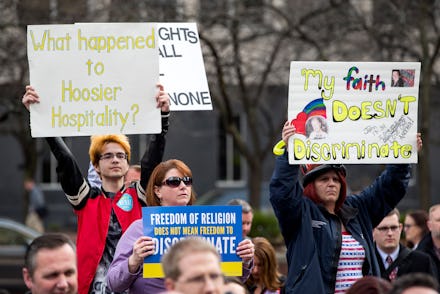Why Even Walmart and NASCAR Are Opposed to Indiana and Arkansas' Anti-Gay Bills

Corporate America wants you to know that it cares deeply about gay people.
In the past week, Indiana passed a "religious freedom" bill into law that many legal experts believe creates opportunity for business owners, employers and landlords to cite their private religious beliefs as legal grounds for discriminating against the LGBT community and refusing them service or equal treatment. Arkansas' state legislature approved a nearly identical bill Tuesday.
After a firestorm of controversy, the Republican governors of both states have called for changes to the bills to rule out the possibility of discrimination.
Nonetheless, they have generated an unusually diverse range of critics. In addition to progressive media outlets and gay rights advocates, politicians across the country offered a stern response — mayors of cities like Seattle and San Francisco announced bans on publicly funded travel to Indiana. The sporting world has gotten involved as well — the NCAA announced its opposition to Indiana's law, as have owners of professional sports teams.
But what may be most remarkable about the response has been the number of massive corporations that stepped into the fray.
Take a look at the statement Walmart issued Tuesday night, following the approval of Arkansas' religious freedom bill by the state legislature:
Walmart is not alone. NASCAR, Apple, Yelp, Salesforce, Gap, Levi's, Nike, American Airlines and many other companies have public expressed disappointment or disagreement with one of the new bills.
Not so fast: Are we witnessing a great awakening, in which we discover that corporate behemoths do have a soul underneath their steely, profit-maximizing exterior? Don't hold your breath.
Companies like Walmart issuing dramatic statements about "respect for the individual" and a "spirit of inclusion" is curious. Walmart spends enormous amounts of money on lobbying, but it has no serious record of supporting LGBT equality.
What we do know that Walmart has a serious record of treating its workers poorly. Walmart is the largest retailer in the world. Its owners, the Walton family, control a fortune equivalent to about the bottom 40% of Americans combined. But Walmart pays most of its workers wages that are virtually impossible to live on, and consistently attacks any attempt by its employees to exercise a right to unionize. They also make no fuss about doing business in dozens of countries like China, whose appalling labor standards make Walmart's look generous.
Walmart and companies like it haven't spontaneously grown firm convictions about gay rights. They're making sound calculations about the zeitgeist and the cultural momentum of LGBT rights in America. They're angling to be on the right side of history the moment they sense it's safe.
In the 21st century, major corporations have a fixation on cultivating an image of being good for the world without risking any profit in order to do so. They're eager to cash in on fashionable ethics without dedicating themselves to real change. It's important to pay attention to their stances on what's right and wrong mainly when it's not one guaranteed to comfortably boost their image.